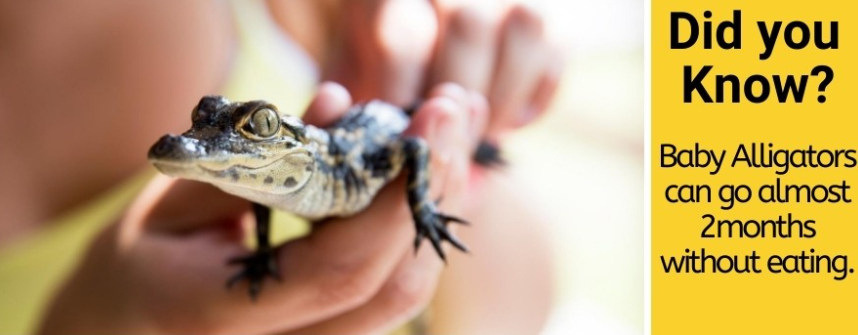Alligator Survival: How Long Can an Alligator Go Without Eating?
The natural world is filled with fascinating creatures that have adapted to survive in various environments. Alligators, known for their ancient lineage and formidable presence, are a prime example of such creatures. One common question that arises is how long these reptiles can go without consuming food. In this article, we will explore the factors that influence an alligator's ability to survive without eating, shedding light on their remarkable adaptations and behaviors.

How long can an alligator go without eating?
1. The Alligator's Remarkable Adaptations:
Alligators are well-equipped for survival in their habitats, thanks to their unique adaptations:
Carnivorous Nature: Alligators are carnivorous reptiles that primarily feed on fish, birds, mammals, and other aquatic prey.
Sluggish Metabolism: Alligators have a relatively slow metabolism compared to warm-blooded animals, allowing them to conserve energy.
Energy Storage: Their ability to store energy in fat reserves provides a buffer for periods of scarcity.
2. Factors Influencing Alligator Feeding Habits:
Understanding the factors that influence an alligator's feeding habits is crucial to gauging how long they can go without eating:
Ambient Temperature: Alligators are ectothermic, meaning their body temperature is regulated by their environment. Cooler temperatures can slow down their metabolism and reduce their need for food.
Size and Age: Juvenile alligators have a higher metabolic rate and may need to eat more frequently compared to larger, older alligators.
Habitat Conditions: The availability of prey in their habitat plays a significant role in determining their feeding frequency.
3. Alligators and Feeding Frequency:
Alligators are opportunistic predators, and their feeding frequency varies based on several factors:
Regular Feeding: In their natural habitats, alligators typically feed every few days to once a week, depending on factors such as food availability and temperature.
Seasonal Changes: During colder months, alligators may enter a period of reduced activity and decreased feeding, conserving energy.
Metabolic Adaptations: Their ability to adjust their metabolic rate allows them to survive periods of food scarcity.
4. Surviving Without Food:
Alligators have evolved strategies to survive without eating for extended periods:
Energy Reserves: Alligators store energy in their bodies in the form of fat. These reserves sustain them during periods when food is scarce.
Slowed Metabolism: Their ability to reduce metabolic activity allows them to conserve energy and survive on fewer calories.
Estivation: In extremely hot or dry conditions, alligators may enter a state of estivation, reducing their activity and energy expenditure.
5. Maximum Duration Without Eating:
The maximum duration an alligator can go without eating varies based on individual factors:
Size: Larger alligators can store more energy and survive longer without eating compared to smaller ones.
Temperature: Cooler temperatures can slow down metabolic processes, enabling alligators to sustain themselves for longer periods.
Activity Level: Alligators that are less active may require fewer calories and can potentially go longer without eating.
6. Real-World Scenarios:
Instances of alligators surviving without food for several months have been documented:
Winter Dormancy: In colder months, alligators in temperate regions may enter a state of dormancy, surviving without eating until temperatures rise.
Harsh Environments: Alligators in challenging environments with limited prey resources have demonstrated remarkable resilience in surviving prolonged periods without food.

Baby alligators
Alligators are impressive creatures that have developed unique adaptations to thrive in their environments, including their ability to survive without eating for extended periods. Factors such as ambient temperature, age, size, and metabolic rate influence their feeding habits and the duration they can go without consuming food. Their energy storage mechanisms, slowed metabolism, and adaptability to environmental conditions contribute to their survival in the wild. While alligators can endure without eating for notable durations, it's important to recognize that their natural behaviors and feeding patterns are complex and shaped by a variety of factors inherent to their ecosystems.